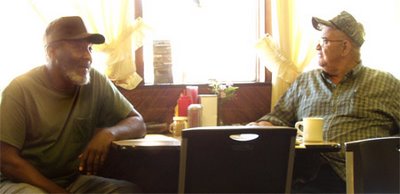A Tribute To Teachers. Thousands of communities will take time out during May to honor the teachers in their communities. It wouldn't take much creativity for a community-minded church to program a special emphasis / theme-campaign as a withreach opportunity... having the potential to create many new relationships, cultural bridges, and a high-profile catalyst for transformation. September would be another good time, oh and don't forget private schools and homeschool "teachers."
For ideas, just Google "teacher's day," but here's a few: click... here, here, or here.
Friday, April 20, 2007
Tuesday, April 10, 2007
Back Office Work
Tuesday, February 20, 2007
Easter in the era of "whatever"
In a recent brainstorm with some 20-30 year olds, we sought to rethink a familiar challenge, one that usually goes like this... When Easter rolls around the churches in America face a major dilemma: One one hand, Easter is probably the most effective time of the year to raise their profile (fishing when the fishing is good). On the other hand, the US population who still have favorable memories or understand the meaning of Easter is a diminishing audience. Though it remains one of the best times of the year to build awareness (and attendance) we searched for a way that also speaks with relevance to this growing sector. We had these goals for it: 1) it had to connect to an authentic felt need, and 2) do it in a clear and simple way, and 3) be seen as coming from real, unpretentious, caring people.
This led to the development of the Don't Change A Thing campaign.
Here are a few examples (the rest can be found on the Breakthrough site). I will be posting more ads and photos here and would love your feedback on them.

Headline:
Don't Change A Thing. ... If It Changes Who You Really Are.
... and some suggested reverse side text:
This led to the development of the Don't Change A Thing campaign.
Here are a few examples (the rest can be found on the Breakthrough site). I will be posting more ads and photos here and would love your feedback on them.

Headline:
Don't Change A Thing. ... If It Changes Who You Really Are.
... and some suggested reverse side text:
Everyday we encounter pressures to conform, to approach life-change as an outside-in acquisition of principles and social norms, rather than an inside-out process of becoming our true selves. The Bible contrasts a life of conforming with a life that's transforming. It speaks of regeneration, renewal of our minds, and being reborn. But the fact is, it's far easier to cave in to expectations. It takes courage to live out of your true heart and follow the dreams you were meant to fulfill. If you're looking for people who will treasure the real you and support you in your journey, we'd like to be that people. A new day is dawning, and we can begin this Easter to resurrect the life we were meant to live... lives not meant to conform to the world, but transform it!I've posted a few of these in the: Portfolio, but ideas for other target audiences (by way of their photo representation on the cover) could go in many interesting directions. Where would you want to go?
Thursday, February 15, 2007
Idea Starters
I'm working on some new campaign ideas...sure love to get some advance feedback (here or by email). These pieces are part of an ongoing development for use in engaging a community (families, kids, youth) to awaken God-given dreams and begin conversations and dream-coaching relationships. Do they spark ideas in you?




Thursday, October 26, 2006
Holy Ground Cafe

I took a seat in our local cafe the other day across from these gentlemen, one black, one white. I snapped a picture while they were deep in conversation. And just for a moment I thought, this is holy ground, the kind of place Jesus would hang out...nuetral ground at the cross roads of culture and although there is a kind of informal protocol, it's without pretense or agenda. How many places like this exist in our communities, do we know whre they are?
Ray Oldenburg, in his book Celebrating the Third Place: Inspiring Stories About the "Great Good Places" at the Heart of Our Communities, explores the contribution of cafes like this. I found one comment on the book interesting:
"Dr. Oldenburg helped me to understand that when good citizens of a community find places to spend pleasurable hours with one another for no specific or obvious purpose, there is purpose to such association. One of these places is, of course, our cafe environment. We provide an informal public gathering place which is not and can not be supplied by any other agency in the society."

Oldenburg positions "third places" beside home and work. I wonder... Knowing that the church is people (we have to keep reminding ourselves), what would have to change to make the church qualify as a third place? How could we create these wonderful, highly-engaging 'front porches' in our community?
Sunday, August 20, 2006
Saturday, August 19, 2006
Do we do discipleship the way Jesus did?

I'm currently working on a long-term development plan for a discipleship ministry. In the process of thinking through key directions, I feel God challenging me to examine our whole approach to discipleship, generally asking... why we don't disciple people the way Jesus did. I have been in ministry for over 30 years, but I have been stopped in my tracks over this, and I'm having a difficult time identifying any present day examples of discipling as Jesus did. Most church-based discipleship is classroom oriented. Even those more relational, one-on-one approaches are still quite formal, didactic, cognitive, or curriculum-based. Some mission-based approaches add experiential components, but could they be proposed across the board and effectively applied to all Christians in all walks of life?
I have four questions:
1) What were the essential qualities in the way Jesus discipled others?
2) Do you know of good, present-day examples/models in use?
3) Could we suggest a truly biblical model for today based on the clear example of Jesus in the four Gospels?
4) Is there any justification for our wholesale abandonment of Christ's own example?
For me this is not simply an academic exercise, since I am working on a plan that could impact the direction of a ministry. So I do hope there are some good answers to be found.
Here's one way to get at it... What if we first took what might be seen as the basics of good mentoring: 1) provide essentials and key principles, 2) dramatize and demonstrate in real life, 3) commission them to do it on their own, 4) provide evaluation, support, affirmation, and guidance to perfect, internalize, and integrate with personal life and calling.
And if we would say that the core ingredient of the enduring disciple was loving God (with a whole heart), then what could the discipleship process look like? Would the process look like anything we presently see? And how would you provide experiences that impart an authentic, enduring love of God?
Thoughts?
Michael
Subscribe to:
Posts (Atom)






